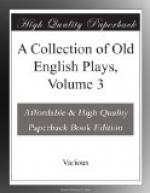Eld. True, daughter; love is like the weassell that went into the meale-chamber; it comes in a littill chyncke no bygger then our eie syghte, but haveinge a whyle fedd on imagynatyon dreames sonnetts to the tune of syghes and heyhos; it growes plumpe and full of humor; it asks a crannye as bygg as a conye borrowe to gett out agayne.
Gab. And wherefore then should I trust
in the face?
Mother, tys true your sonne, my cruell brother,
The toe much wise, toe subtyll Ganelon,
Onlye withdrawes Richards affectyon.
Even to my selfe a swore a should not love me;
And who that knowes hym, knowes he is not ledd
By the charme of hys voyce onlye?
Eld. Trust me, wenche,
Twas tyrannye to speake so; but in thys
Where lyethe our preventyon?
Gab. Onlye thus:
You must by all meanes styrre dissentyon
Twixte Rychard and my brother, tourne their
loves
To mortall hate and emulatyon;
Which but effected, Richard suer will love
Bee’t but alone to crosse hys enemye.
Eld. Content thy selfe, gyrle. There is not the malytious creature nowe liveinge, no, not a venemous and craftie stepdame, nor a tale-carr[y]inge, truthe-pervertinge gossypp cann make theire seedes of enmytie poyson the love of parentts, husbands, neighbours or good fellowshypp sooner or more effectuallye then I will crosse theire frendshypp. But to better purpose—
Gab. Peace, no more: here comes the aged byshopp The kyngs inamord darlinge.
Enter Turpin.
Tur. Best ladye, well encounterd: howe runns chaunce With your deare sonne, my good lord Ganelon?
Eld. Better then envye wishes, gratyous
sir.
Lost from the courte he left behynde hym there
All cares and all vexatyons: nowe he sleepes,
Eats, drynks and laughes, and, but when he dothe sweate,
Moves not hys hatt tyll bedd tyme; dothe not fawne,
Nor croutche, nor crynge, nor startche his countenance;
Is not tane up with other mens affayres
But onlye looks to’s owne comodytie.
Tur. Hys chaunge was passynge happye then, it seemes.
Gab. Bothe for hymselfe and hys; for,
greate sir, nowe
He onlye wayts on hys partycullar,
Seeks from a cuntrye comonwealth to rayse
All hys to cuntrye fortunes; which, they say,
Is safest, surest, and least envyed.
Tur. Why, prettie Ladye, you’le not leave the courte?
Eld. Yes, gratyous lorde; I’me sent
to bringe her thence.
Our pore retyred famylie must plante
Theire braunches in the broade ayre, not be plashd[91]
Or propt agaynst the walls of pallaces.
Tur. I doe comend your tempers, but, madam,
tys
Hys highnes pleasure, for some spetyall ende
Onlye to hym reveald, that instantlye
Your sonne repayre to’th courte, which I intreate
You will imparte unto hym.




